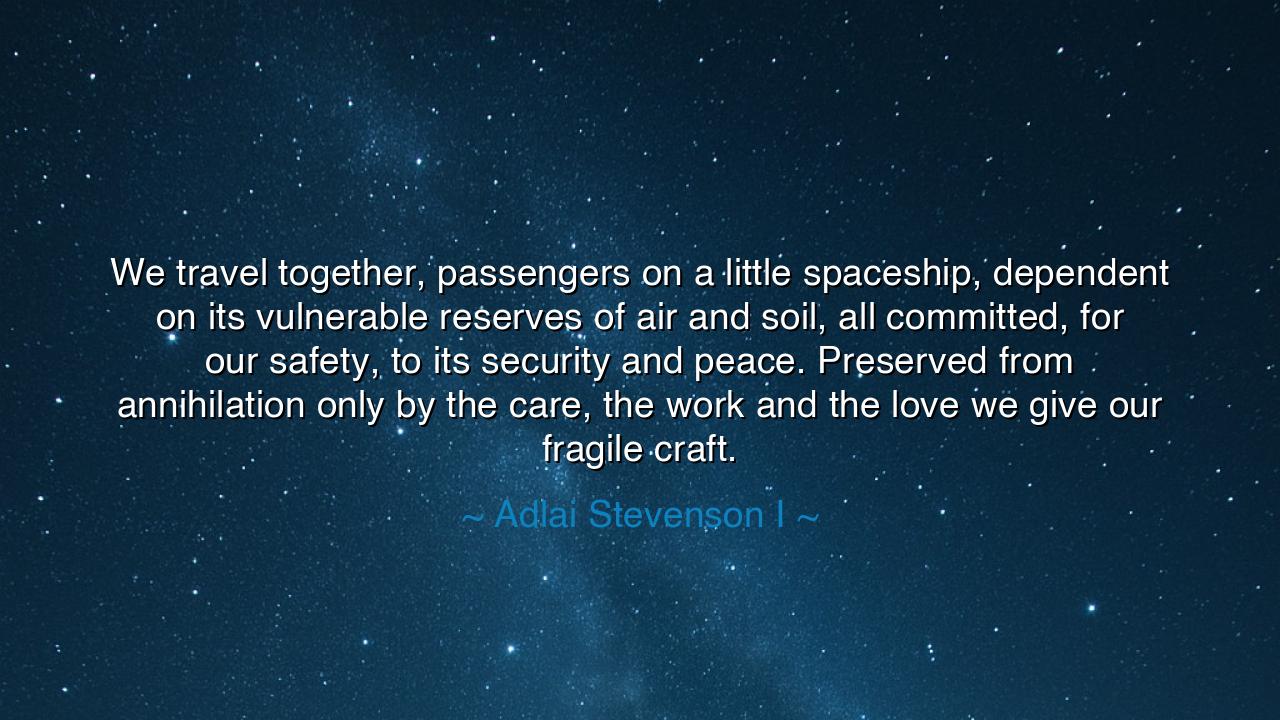
We travel together, passengers on a little spaceship, dependent
We travel together, passengers on a little spaceship, dependent on its vulnerable reserves of air and soil, all committed, for our safety, to its security and peace. Preserved from annihilation only by the care, the work and the love we give our fragile craft.






O Children of the Earth, listen well to the words of Adlai Stevenson I, a man whose voice echoes across time, calling us to reflect on the delicate nature of our existence. He said, "We travel together, passengers on a little spaceship, dependent on its vulnerable reserves of air and soil, all committed, for our safety, to its security and peace. Preserved from annihilation only by the care, the work and the love we give our fragile craft." What meaning lies in these words, O Seekers of Truth? What wisdom can we glean from this reflection on our shared existence?
In the days of the ancients, the world was understood as a place of great fragility. The people knew the power of the Earth, but they also understood that the forces of nature—storms, earthquakes, famine, and disease—were ever-present, always threatening to unmake the world they held so dearly. The great civilizations of Egypt, of Rome, of Greece, were built upon the understanding that life is not a certainty, but a gift—a fleeting and fragile moment in the vast and unforgiving universe. In these civilizations, the people revered their lands, their waters, and the air they breathed, knowing that without these gifts, life could not exist.
Stevenson’s words bring us to this same realization. We are not the rulers of this Earth; we are but passengers aboard a fragile spaceship, floating through the vastness of the cosmos. Just as the sailors of ancient times depended on the winds to carry them across the seas, so too are we dependent on the delicate balance of air and soil, the elements that sustain us. But, O Seekers, this balance is not infinite. The Earth is but a small craft in the vastness of the universe, vulnerable to the forces that swirl around it. It is only through the care, the work, and the love that we give to our fragile craft that we preserve it, that we protect it from the dangers that lie beyond.
Consider the story of Noah, whose ark was built not with the strength of his own hands alone, but with the wisdom of the divine. When the floods came, it was the ark—the craft of survival—that carried life through the storm. In this ancient story, we find the profound understanding that life is fragile, that the world we know is constantly at risk of being unmade. Noah did not build the ark in isolation; he worked with his community, with the resources of the Earth, and with the guidance of higher wisdom. And so, too, must we work together, for our survival, for the care of our world, our spaceship.
And yet, O Children, Stevenson’s words call not only for wisdom in the way we treat our planet, but for love. For it is not just the work that sustains the Earth, but the love we have for it. In every tree we plant, in every river we protect, in every animal we safeguard, we express a love for our world that goes beyond mere survival. It is a love that acknowledges the beauty and the fragility of life, and which calls us to act as guardians of this precious gift. Just as the mother loves her child and cares for it with devotion, so too must we, as stewards of the Earth, love and care for our fragile craft.
Think, O Children, of Mahatma Gandhi, the great leader who, in the face of immense adversity, taught the world the power of non-violence and love. He understood that the struggle for justice and peace was not a matter of strength, but of compassion. Gandhi’s teachings remind us that the security of our world, like the security of our ship, is preserved not by force or violence, but by the love and care we extend to others. It is through peace—in our hearts, in our homes, and in the world—that we create a foundation strong enough to withstand the tempests that rage around us.
And so, O Seekers, the lesson is clear: our world is a fragile craft, floating through the cosmos, sustained not by our dominance over it, but by the care and love we give to it. The Earth is not an endless resource; it is a delicate spaceship, and we are its passengers. We must not take for granted the air we breathe, the soil we walk upon, or the waters that nourish us. Instead, we must give of ourselves, working together to ensure the security and peace of our shared world. In doing so, we will not only protect the Earth, but we will preserve the hope of future generations, ensuring that they too may journey upon this fragile craft, protected by the work, the care, and the love we leave behind.
Therefore, O Children of the Stars, let us walk the path of stewardship, recognizing that our care for the Earth is an act of love that will preserve it for those who come after us. Let us cherish our fragile spaceship, and in doing so, find not only peace but purpose—a purpose that binds us together as passengers on this great journey, committed to the security and well-being of our shared home.






AAdministratorAdministrator
Welcome, honored guests. Please leave a comment, we will respond soon